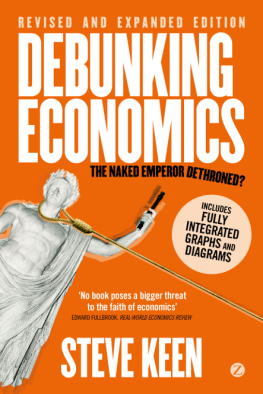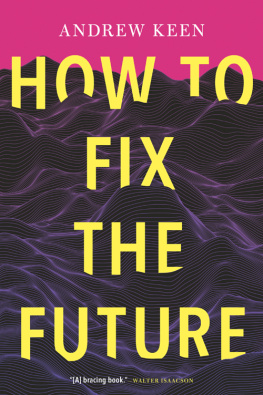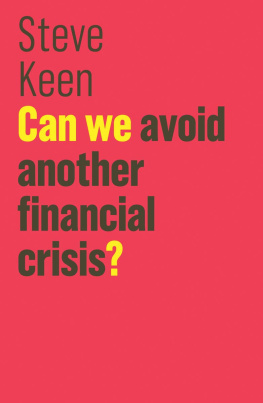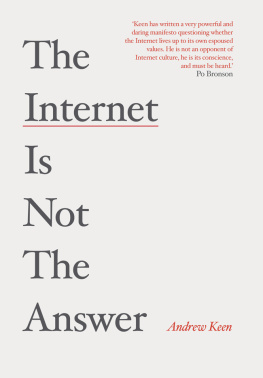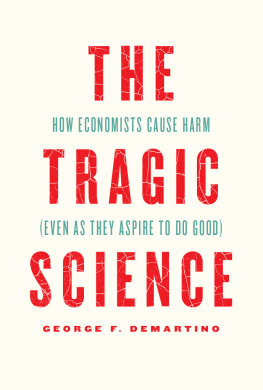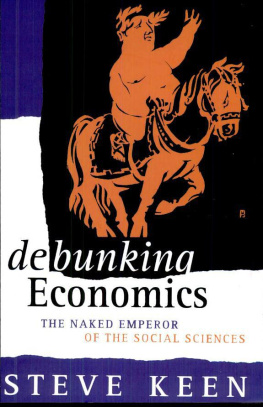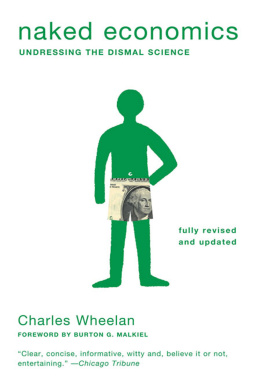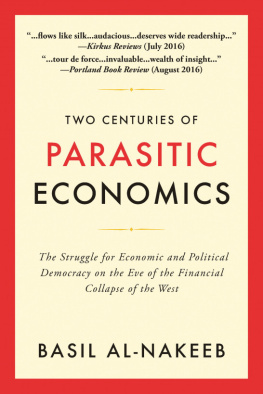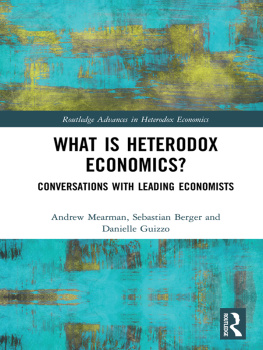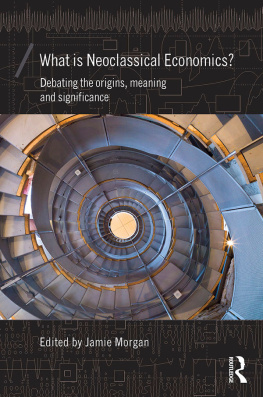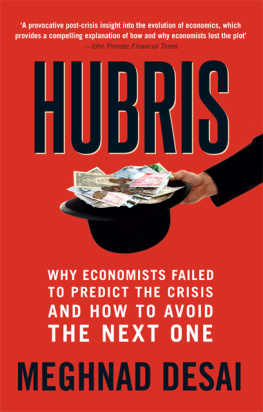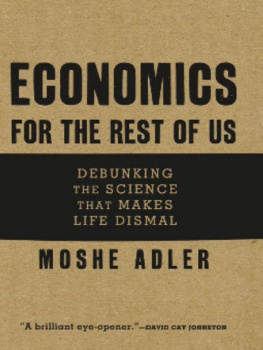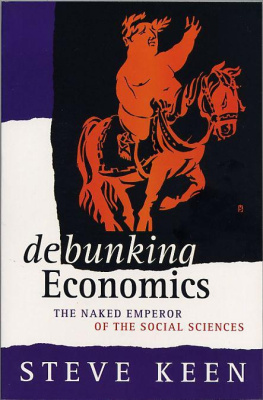Steve Keen is professor of economics and finance at the University of Western Sydney. Steve predicted the financial crisis as long ago as December 2005, and warned back in 1995 that a period of apparent stability could merely be the calm before the storm. His leading role as one of the tiny minority of economists to both foresee the crisis and warn of it was recognized by his peers when he received the Revere Award from the Real-World Economics Review for being the economist who most cogently warned of the crisis, and whose work is most likely to prevent future crises.
Praise for the first edition
Professional economists include their own best critics. Steve Keen is one of the very best translating the algebra into plain language, he deploys a devastating theoretical attack on neoclassical theory. Hugh Stretton, author of Economics: A New Introduction
Keens serious but accessible look at the shaky logical and mathematical foundations of neoclassical economics will be of great interest to students and open-minded economists alike. Don Goldstein, Professor of Economics, Allegheny College
Particularly useful to those, like myself, who are interested in economics but not formally trained in it. Debunking Economics reveals that neoclassical economic doctrines are faulty because the fundamental assumptions from which such doctrines have been derived are less than self-evident. Henry C.K. Liu, Chairman, Liu Investment Group
A wide-ranging yet accessible critique of the staples of neoclassical pedagogy. Alan G. Isaac, Associate Professor of Economics, American University
Our hope must be that Debunking Economics will be read by enough people to prompt reform of our economic thinking and save our endangered societies. James Cumes, author of How to Become a Millionaire without really working
Debunking Economics will transform the way economics is taught and thought. Jan Otto Andersson, Professor of Economics, bo Akademi University

Debunking Economics Revised, Expanded and Integrated Edition: The Naked Emperor Dethroned? was first published in 2011 by Zed Books Ltd, 7 Cynthia Street, London N 1 9 JF , UK and Room 400, 175 Fifth Avenue, New York, NY 10010, USA
The first edition of Debunking Economics was first published in the United Kingdom and the United States of America in 2001 by Zed Books Ltd, and in Australia by Pluto Press Australia Ltd.
www.zedbooks.co.uk
www.debunkingeconomics.com
www.debtdeflation.com
Copyright Steve Keen 2011
The right of Steve Keen to be identified as the author of this work has been asserted by him in accordance with the Copyright, Designs and Patents Act, 1988
Set in Monotype Plantin and FontFont Kievit by Ewan Smith, London
Index: ed.emery@thefreeuniversity.net
Cover designed by Rogue Four Design
All rights reserved. No part of this publication may be reproduced, stored in a retrieval system or transmitted in any form or by any means, electronic, mechanical, photocopying or otherwise, without the prior permission of Zed Books Ltd.
A catalogue record for this book is available from the British Library
Library of Congress Cataloging in Publication Data available
eISBN 9781780322193
TABLES, FIGURES AND BOXES
PREFACE TO THE SECOND EDITION
Debunking Economics was far from the first book to argue that neoclassical economics was fundamentally unsound. If cogent criticism alone could have brought this pseudo-science down, it would have fallen as long ago as 1898, when Thorstein Veblen penned Why is economics not an evolutionary science? (). Yet in 1999, when I began writing Debunking Economics , neoclassical economics was more dominant than it had ever been.
My reason for adding to this litany of thus far unsuccessful attempts to cause a long-overdue scientific revolution in economics was the belief that a prerequisite for success was just around the corner. As I noted in my concluding chapter, I felt that a serious economic crisis was approaching, and that when this crisis hit, fundamental change in economic theory would be possible:
I am not wishing an economic crisis upon the modern world instead, I think one has been well and truly put in train by the cumulative processes described in [on finance]. If that crisis eventuates one which neoclassical economic theory argues is not possible then economics will once again come under close and critical scrutiny. ( Debunking Economics , 1st edn, p. 312)
When I finished Debunking Economics , I hoped to be able to start work on a book with the working title of Finance and Economic Breakdown , which would have provided a comprehensive theory of the forces that would cause this crisis. Instead, the reaction from neoclassical economists to of Debunking Economics Size does matter, on the neoclassical model of competition was so vehement that I spent much of the next four years developing the arguments in that chapter in response to their attacks.
Finally, in December 2005, I returned to writing Finance and Economic Breakdown (for Edward Elgar Publishers). Almost immediately, unforeseen circumstances intervened once more, when I was asked to be an expert witness in a predatory lending case. One look at the exponential growth in the debt-to-GDP ratios for Australia and the USA convinced me that a truly huge crisis was imminent.
I decided that raising the public alarm was more important than writing an academic treatise on the topic, so I reluctantly delayed the book once more and turned to the media and the Internet instead. I published a monthly report on debt, starting in November 2006 (), which now has over 10,000 registered users and attracts about 50,000 unique readers each month (with about 25,000 of those being Australian, and most of the rest coming from America and the UK), and in what passed for spare time, worked to complete a model of debt deflation to inform my public comments.
The economic crisis began with a vengeance in September 2007. Unemployment in the USA doubled in the next year, while a 5 percent rate of inflation rapidly gave way to 2 percent deflation.
The complete failure of neoclassical economics to anticipate the crisis also meant, as I expected, that economic theory and economists are under public attack as never before. Their defense has been to argue that no one could have seen this coming. They have taken refuge in the phrase that this crisis was a Black Swan, using Nassim Talebs phrase completely out of context (), and ignoring the fact that I and many other non-neoclassical economists did in fact see this coming.
I therefore decided that, for both positive and negative reasons, a new edition of Debunking Economics was needed.
The negative reason is that there is no better time to attack a fallacious theory than after it has made a spectacularly wrong prediction. By arguing that the macroeconomy had entered a permanent Great Moderation (the phrase Ben Bernanke popularized to describe the apparent reduction in economic volatility and falls in unemployment and inflation between 1975 and 2007), neoclassical economics couldnt have been more wrong about the immediate economic future. Now is the time to show that, not only was this crisis eminently foreseeable, but also neoclassical economists were about the only ones who were ill equipped to see it coming. The main positive reason is that, with the public and policymakers much more amenable to alternative ways of thinking about economics, now is the time to provide a brief and accessible look at an alternative, realistic model of the economy.

